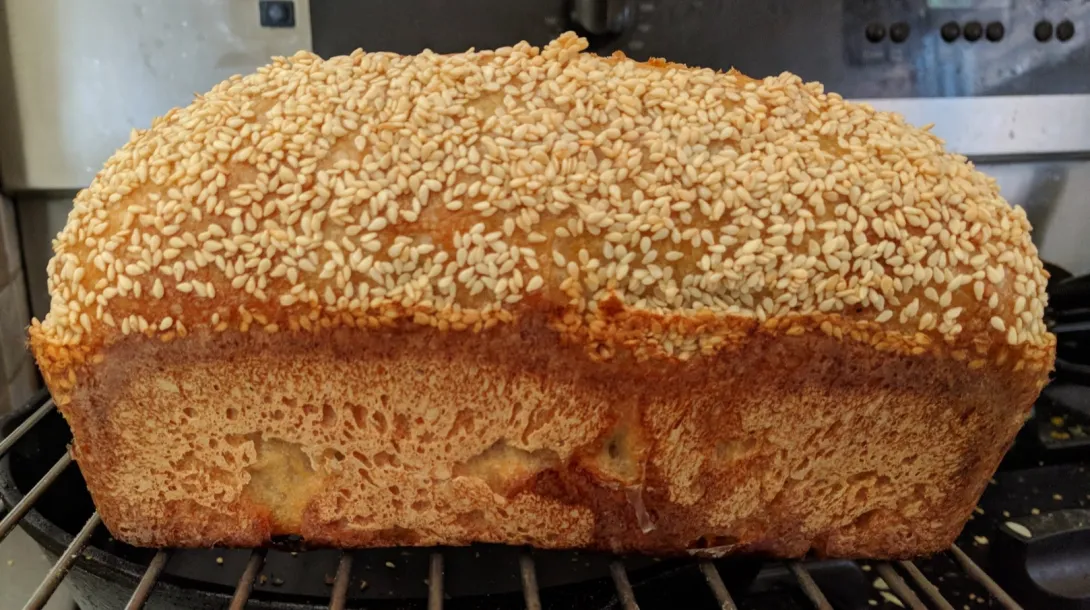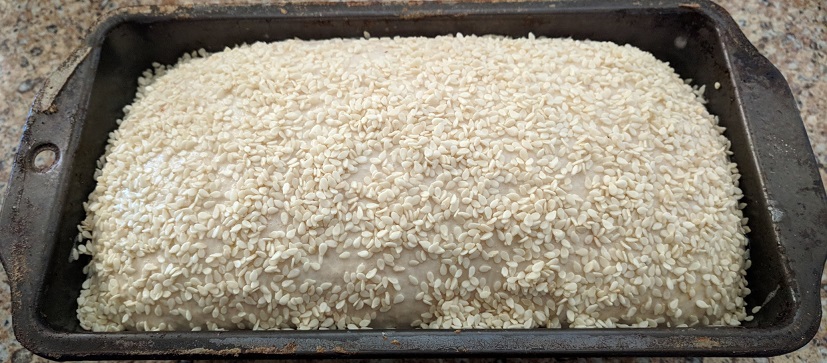
I've mentioned this in a few other posts. Originally this came about due to my lack of experience and not knowing how to do stretch and folds to build up some structure for a free standing loaf (Also I had given away my Dutch Oven) so I started making my sourdough in a loaf pan and put a second loaf pan, upside down, over the top to hold in the steam and to prevent the top of the loaf from oozing over the sides into a mushroom shape.
Since then, I've been doing stretch and folds and my dough is able to hold a nice shape - however I've come to love the double loaf pan method. The sourdough bread I've been making is the best sourdough I've ever had and I really like the shape of the loaf as it's so easy to cut and fits in my toaster and makes terrific sandwiches.
I see so many pictures of artisan breads with extremely open crumb - but I shoot for a crumb that is open but without mouseholes so it'll hold all my toppings without dripping.
This is a 1-2-3 with 50% fresh ground Hard White and 50% AP flour. I'm using a SanFrancisco starter (from Breadtopia) that has a lovely vinaigrette smell and delivers that classic San Francisco sourdough flavor. About 15 hour bulk ferment at 50F (cold kitchen counter with an ice pack)

It has been nearly doubling in size with ovenspring. The dough is barely reaching the top of the breadpan when I put it in the oven:

Brush with eggwhite and sprinkle with sesame seeds
After experimenting I'm getting the best results with one long, vertical, deep slash:

The loaf pictured above is still hot so no crumb shot yet. But here is yesterday's crumb shot - this loaf has less whole wheat though - about 25% (the loaf above is 50% WW):
Really nice loaf of bread AP.
Much of the chatter around here is about an open crumb and a deep, dark crust. Challah is a wonderful bread but could you imagine challah that was baked to those standards? As Trevor Wilson writes in this post:
http://www.breadwerx.com/make-sourdough-pan-bread-video/
sometimes a pan loaf is just what is needed. I bake for customers and my second-most popular bread is the Sourdough Pan Loaf.
I'd say you have a winner here. You should be very happy, especially with in inclusion of whole wheat. The loft is impressive.
I'll have to try the inverted loaf pan on top to prevent mushrooming. Clever.
Thanks for the kind comments!
I just took a picture of the crumb of the 50% whole wheat and it doesn't look much different from the picture with less but the flavor is definitely different. I am using Wheat Montana Prairie Gold so it's light in color.
I'd be really pleased with a 50% WW like yours. Congratulations!
a loaf pan with another on top was a post from Mini Oven several years ago. She also uses a couple of those metal spring clips normally used to hold papers together, to hold the two lips of the pans together securely and even get a better seal under steam pressure. It really does work well.
Your bread at 50% whole grain is just perfect for toast and sandwiches which is what 90% of all bread is used for around here. Well done, happy baking and
Happy New Year!
Hey Andy, I am a 77 yr. old grunt that is just starting this trip. I love the look of your loaf. Would you be willing to share your starter recipe and also the recipe and instructions for this great looking bread? I would like to make this every other day for myself. Thanks for any help. David K1264
Hey David - I'm still learning how people notate recipes here so I'll give it my best :) I experiment and don't follow any set recipe very closely.
I bought my starter from breadtopia and I love the smell and flavor - but it does behave differently from other starters I've used (it won't rise at all if it's too cold - so I can't use my fridge for the overnight) but your starter may behave differently. And when I say I used the 1-2-3 method that means 1 part starter/levain to 2 parts water to 3 parts flour (by weight) --- my small loaf pans work best with 600 grams of dough so 300 grams flour 200 grams water and 100 grams starter
For the starter, I bake a loaf each day so I use 100 grams of my levain or starter (it stays in my kitchen which is about 55F this time of year so I only have to feed it once a day). Essentially I take out 100 grams and that leaves behind a Tbs or so and I add back in 50 grams of flour (either white or wheat - whichever I'm feeling like that day) and 50 grams of water and then tomorrow I'll take out the 100 grams again and repeat. Whether or not you call that "levain" or "starter" is still a mystery to me :) but I'm going to call it "levain" OK?
150 grams fresh ground Hard White Wheat
150 grams AP (or bread flour if you prefer)
200 grams water (I may kick this up to 210 or 220 depending on how the dough feels humid or dry day etc.)
100 grams ripe levain (100% hydration)
7 grams salt
(I also add "a pinch" of diastic malt - but you certainly don't need it and I'm not sure if it makes a difference - I'm experimenting)
Autolyse without salt 30 minutes to 2 hours then knead in salt and levain
Knead 4 minutes
4 sets of stretch and folds with 30-40 minutes between at 85F
Shape and put in loaf pan and cover with second, inverted loaf pan and cool retard overnight
Eggwash - sesame seeds - spray with water - slash
425F covered 20-25 minutes uncovered another 20-25 minutes
========================
I put the flour and water in my Ankarsrum mixer bowl - pour the water in and give it a quick stir by hand just to moisten the flour (no kneading at all - just a couple of stirs with a spatula) then I cover the bowl with a plastic bag and autolyse for about 2 hours. If my levain is already peaking I may not wait the full 2 hours (30 minutes seems to be enough) and if my levain is nowhere near peaking I'll put it in a warm place to get it going faster (oven with light on about 80-85F) and let the flour/water autolyse until my levain is ready. I want to dump the levain in when it's good and active. And because I don't want to forget the salt, I sometimes put the salt in next to the dough but not mixed in during the autolyse - otherwise I put the salt in same time I add the levain. Whatever works for you so you don't forget the salt :)
I mix on my Ank mixer for 4 minutes medium speed then turn it out on the counter and do several stretch and folds and then into a bowl (I actually use a square tupperware) and cover (I use a plastic bag) and set in the warm oven 85F 30-40 minutes - Then turn it out and do stretch and folds (it'll be much tighter already and you probably only can do two or three stretch and folds) and cover it and back in the warm oven for another 30-40 minutes and repeat. Third time it's probably tightened up to where you can only do 2 stretch and folds and then back in the warm oven another 30-40 minutes ---- depending on how it feels this time I'll either do one more stretch and fold or I'll shape it now and into the loaf tin and someplace cool enough that it'll take about 10-12 hours to rise. (your temp and your sourdough culture and how your dough feels will determine how long it takes so you just have to be able to tell when it's ready).
Hope that makes sense